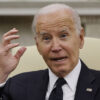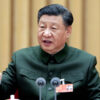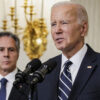
President Obama’s trip to Europe has been revealing. Many people had high hopes that Obama may turn out to be a closet moderate. After all, his position on Afghanistan wasn’t all that bad, some said. Unfortunately, the picture is now clearer; his statements and actions in Europe show just how unrealistic those hopes were.
Consider what Obama did in Europe:
1. The day after North Korea launched a missile that someday may be capable of delivering a nuclear weapon against the United States, who did he put in the nuclear dock with North Korea? The United States! Obama’s speech on banning all nuclear weapons and testing implied that the U.S. is as much a part of the nuclear problem as North Korea. Why else focus on a global ban of nukes and testing that could affect us adversely but would not affect North Korea at all? Yes, he condemned the North Korea launch, but he completely muddled the message.
2. After getting roundly rebuffed by Europeans at the G-20 meeting for pressing them to increase their bailouts as he had done, he agreed to commitments that are as irrelevant to the global financial crisis as they are dangerous to our future prosperity. Worse, the promise to subordinate the pay and practices of America’s financial institutions to the political whims of ‘corporate social responsibility’ and a new international regulatory board strikes a blow at our economic freedom and political sovereignty.
3. He called for new nuclear arms agreement with the Russians that will be negotiated under the pressure of a political deadline. Russia will undoubtedly use these talks to minimize any adverse U.S.reaction to its bullying of Georgia and other countries that it deems to be in its sphere of influence. That’s called “linkage” by diplomats, which in this case will “link” our desire to continue the talks to Moscow’s commitment to destroying Georgia’s independence.
4. On French soil, he accused the United States of America of “arrogance” (yes, that was in France), and he called for a “collective action” that essentially demotes America as a world power. Obama relegates America to the status of a second-rate power—think of us as the chairman of the board of international consensus.
5. Again, on French soil, he accused America of torturing people, which produced rapturous applause from his French audience. They sat mute when he bemoaned European anti-Americanism and said the war in Afghanistan must be won.
6. He turned his personal popularity, which should have been a U.S. asset, into a cruel liability for U.S. interests. He got precious little from the Europeans on Afghanistan—essentially trainers, most of whom will be based there only temporarily—and he was rebuffed (thank goodness) on his main agenda item, more stimulus spending. Because his popularity in Europe is based on the premise that he will deliver European priorities, he ended up giving European governments’ all the political space they needed to prevail on their agenda (which actually is Obama’s agenda, too). What should have been American priorities–protecting Americans from missile attack or getting lots of European combat troops in Afghanistan—were not even taken seriously by the Europeans, much less honored. Obama’s wink and nodding that it was all Bush’s (read: America’s) fault strengthened the political hand of the Europeans in ways they could not have dreamed of..
7. And, at the very time he was crisscrossing Europe pretending to be the first European president of the United States, his defense budget cuts were announced. They include a $5 billion cut to the military’s modernization programs, and a near 17 percent cut in the budget for missile defense—just two days after North Korea launched its long-range missile. Why is national security the only area of the budget in which he shows fiscal restraint? Combined with his abdication of American leadership at the G-20 and NATO summits, this weakening of American military power heavily implies that Obama has consciously accepted the idea that America is and should be a declining military power.
A lot of people said “give Obama a chance to show what he can do.” He did that in spades in Europe. He’s showing himself unconcerned not only about safeguarding American sovereignty, but about defending American interests and security. This was a sad week for the United States of America.




























